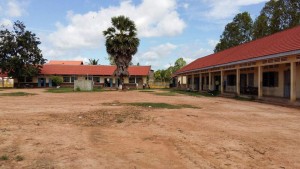Op-Ed: ITI or Information and Technologies for International Development
Conclusion
Streams of politics, problems, and policies united to create the potential of an ICT in education reform in Cambodia. However, the failure to forge the political stream with the streams of problems and policies continues to hinder the mass adoption of this reform. The political stream has yet to be coupled with: the problems of stakeholders; the values of competing political coalitions; the resources available to competing goals, individuals, and policies; and the policies that support the ICT in education reform.
 The present analysis has demonstrated that, as Cambodia progresses in planning and implementing the ICT in education policy, government policy makers would be advised to thoroughly plan the implementation process versus allowing implementation to be ad hoc. The current analysis indicated that to institutionalize the ICT in education reform, focus needs to be placed on the political stream. Based on the data presented above, a few conclusions and recommendations can be made for this reform’s implementation and evolution.
The present analysis has demonstrated that, as Cambodia progresses in planning and implementing the ICT in education policy, government policy makers would be advised to thoroughly plan the implementation process versus allowing implementation to be ad hoc. The current analysis indicated that to institutionalize the ICT in education reform, focus needs to be placed on the political stream. Based on the data presented above, a few conclusions and recommendations can be made for this reform’s implementation and evolution.
First, there is a need for the MoEYS to be proactive and develop an ICT in education action plan. It is understandable that the government is hesitant to commit funding and resources. However, if the government developed an inclusive, yet flexible, action plan, NGOs, IGOs, international lenders, local business, and local communities could better rise to the challenge and determine where best to put their resources and expertise. This need is linked with closely monitoring ICT in education projects to ensure all aspects of the action plan are addressed by the most competent institutions in the most efficient and effective manner possible.
Second, buttressed with the need for an action plan, is the need for the Cambodian government to pass anti-corruption legislation and thus increase the nation’s transparency. The risk of losing further aid and the possibility of paralyzing future ICT in education efforts is currently quite great. If Cambodia wants to be a global competitor, the government needs to adopt a culture of internationally accepted transparency, governance, and business ethics.
Third, the Cambodian government should distribute and support ICT infrastructure in the education system equitably and ethically in the short and long term. This infrastructure includes continued professional development of teachers, administrators, technology coordinators, and support personnel throughout the country. Internal inequality will erode social, ethical, and national ethos. To leapfrog out of a digital divide and become a global competitor, equity and social justice must be a guiding principle.
Fourth, if Cambodia is serious about an ICT in education reform, it must be willing to take daring risks. The United Nations Economic and Social Commission for Asia and the Pacific (2004) found that, as early as 1993, Cambodia became the first nation to have more mobile telephones than fixed lines. Wireless technology may be a viable alternative to the existing poorly wired-telephone infrastructure. Additionally, banning technologies such as 3G phones signals that the government is not fully prepared to accept the ramifications that access to information may bring.
Fifth, the MoEYS may need to focus on grassroots and community level information and education campaigns and advocacy. This will increase local stakeholder support and increase ownership of ICT enabled education reforms. Partnering with local government units, youth organizations, NGOs, and IGOs to affect demand for such reforms from the bottom up will only increase quality, sustainability, and scalability of ICT in education projects. These acts would ideally make the political stakeholders act together to realize the needed reforms.
Lastly, lessons learned from other countries should not be overlooked by Cambodian leaders. These leaders must determine the implications of ICT in education, remain focused on the infrastructure of rural and urban communities, proactively build capacity, energetically develop indigenous language and content, remain cognizant of costs, and focus on reasonable expectations. The nation of Cambodia has experienced major trials and tribulations. From its height of power in the Angkorian era to its decline during the reign of the Khmer Rouge, the nation has experienced many successes and challenges. The challenges that exist today are not for political power, but for knowledge and innovation. Improving the education system in Cambodia to meet the future needs of a global society is perhaps the most pressing need for this nation. The present analysis has shown that ICT in education may be part of the solution, but only if the reform is implemented through a competent, responsible, and proactive approach that unites streams of policy, problems, and politics. ■
ICT = Information and Communications Technologies
